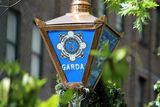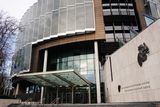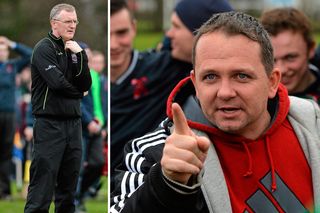'We were left with no other option' - paramedics begin strike as army ambulances drafted in


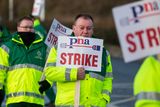
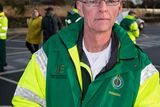

Army ambulances and staff are being drafted in to provide cover for patients today as up to 500 HSE paramedics stage strike action.
Defence Forces' ambulances and trained crew will be based in the east and southern regions.
Striking members of the National Ambulance Service Representative Association (Nasra) will only handle life-threatening and potentially life-threatening calls from 7am until 5pm.
The body is affiliated to the Psychiatric Nurses Association (PNA).
The row centres on the demand by Nasra that the HSE should deduct its union subscriptions at source.
Siptu is not involved in the action.
The HSE is resisting and saying it recognises Siptu, Unite and Fórsa for staff in the service.
In particular Siptu is the recognised trade union for front-line staff, said the HSE.
PNA organiser Brendan Flynn working in the ambulance service picketing at the Dublin South central ambulance station on Davitt Road, Dublin Pic:Mark Condren
"Recognition of other associations or unions would undermine the positive engagement that exists and would impair good industrial relations in the national ambulance service."
It said managers who are qualified paramedics will be carrying out frontline duties today also.
At the National Ambulance Service Dublin South Central station on Davitt Road in Dublin members of the Psychiatric Nurses Association were picketing the gates this morning on day-one of its strike about union recognition.
Marching at the entrance in the bitter cold, they said they were getting good support from the public.
Many motorists passing blew their horns as a show of unity with those picketing.
"We’re out here because of the HSE’s failure to recognise our union within the ambulance service and to deal with it. Our union, the Psychiatric Nurses Association, is a recognised union in the HSE, and we can't understand why they won't deal with us within the ambulance service.
"We want to join the union of our choice and be represented by that union," said Brendan Flynn, PNA organiser in the East region.
Asked if taking ambulances off the roads was a necessary step, Mr Flynn said the workers are providing emergency cover.
"We haven't taken ambulances off the road as such. We have provided emergency cover, and we’ve covered any call that we’ve been asked to cover here today.
"We don't want to inconvenience the public. We never wanted to be here in the first place," he explained.
"We have engaged in industrial action in the last several months through work to rules, an overtime ban, and we called off a dispute on the 19th and referred our dispute into the WRC in the hope that the HSE would meet us there which was the Minister’s preference.
"He said he would have preferred negotiation over confrontation and we facilitated that but the HSE never turned up at the WRC so unfortunately we find ourselves here. We were left with no other option to be honest," he added.
Mr Flynn said the army ambulances supplied for cover during the strike had already been used this morning.
“My information is they have already been used. Certainly the one in Bricins (military hospital)has been used and I believe they have been deployed in the Midlands and in Cork city,” he said.
“We don't want anyone to be left without an ambulance today. We will provide ambulances here from the picket line as requested. We don't want to inconvenience anyone if we can possibly help it,” Mr Flynn added.
In an update on the work stoppage, the HSE said services are being maintained despite the challenges being experienced.
The striking paramedics are demanding that the HSE recognise their parent union – the Psychiatric Nurses Association – after it stopped deducting their subscriptions.
But the HSE described it as a "breakaway union" and warned that recognising it would have a "destabilising effect" on good industrial relations.
"The HSE has confirmed that the National Ambulance Service is currently managing the situation, despite the challenges being experienced," it said in a statement.
"The robust contingency plan as devised and agreed is being implemented nationally."
It said senior management within the NAS are continuing to monitor the situation across the country.
"Their focus is the delivery of a safe service for the public and while the volume of calls to date is as anticipated, the ability to respond has been maintained to date," it said.
"We are continuing to seek to ensure that service and care delivery are not compromised.
"The HSE would advise the public that in an emergency situation they should call 112/999 as normal and the National Ambulance Service will respond."
"It’s been challenging, I have to admit that," said HSE Director of the National Ambulance Service, Martin Dunne.
However, he said that there have been no delays in services and a service was provided in response to all the calls that have come in. He said there were 265 calls up to noon today, which is a normal level.
Meanwhile, patients who are scheduled for surgery or outpatient appointments as well as other procedures on January 30 are expected to begin getting notices of cancellation in the coming days.
It follows the failure of talks to resolve the separate nurses' dispute which remained deadlocked yesterday.
It has now been referred to the Workplace Relations Commission, which mediates between parties involved in industrial relations disputes.
The Irish Nurses and Midwives Organisation (INMO), whose members are to strike on that date, said HSE and Department of Health officials made no offer yesterday.
The unions are demanding pay rises to address the problems of retention and recruitment of nurses.
The nurses' unions chose to refer the dispute to the Workplace Relations Commission.
This was agreed to by management.
Talks are set to begin tomorrow.
Late yesterday Health Minister Simon Harris also said the Public Service Stability Agreement Oversight Body is meeting today to discuss the dispute. Neither of the unions needs to attend.
The unions have so far refused to call off the proposed strike and no suspension will be triggered until progress is made.
The PNA is to impose a ban on overtime on January 31.
Both unions have a further campaign of industrial action planned for February.
INMO general secretary Phil Ní Sheaghdha said after yesterday's meeting that "all the indications seem to be there is no real intent or focus on resolving the dispute".
She warned contingency plans which are being drawn up for January 30 will see all non-emergency surgery and outpatient clinics cancelled.
If the strike goes ahead the nurses will lose general pay rises later this year, increases for newer entrants due to come in April and also the payment of increments.
The Government has said it cannot agree to the nurses' demand, which would cost €300m.
It said it would lead to knock-on claims by other public service groups.
The threatened action comes as hospitals remain under huge pressure from the trolley crisis. There were 486 patients on trolleys waiting for beds yesterday. University Hospital Limerick was hit the worst.
Join the Irish Independent WhatsApp channel
Stay up to date with all the latest news











